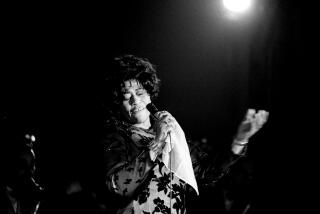From France, a Memorable Father and Son
It’s not exactly late-breaking news that Europe has always been receptive to jazz. Although it took awhile for European audiences and players to fully grasp the intricacies of the music, there were plenty of early listening opportunities, with the Original Dixieland Jazz Band touring England in 1919 and Sidney Bechet performing in Paris in the ‘20s. (He was subsequently honored with a statue there.)
By the early ‘30s, the Quintet of the Hot Club of France, with guitarist Django Reinhardt and violinist Stephane Grappelli, had taken European jazz beyond receptivity and into innovation in its own right. Since then, the music has thrived, often in unlikely circumstances, as writer Michael Zwerin described so thoroughly in his book “Swing Under the Nazis” (Cooper Square Press, 2000).
France, always a hotbed for jazz, has produced dozens of first-rate artists. And pianist Michel Petrucciani, who died in 1999 at age 36, was among the finest. Despite a severe physical disability, osteogenesis imperfecta, that limited his growth to little more than three feet in height and 65 pounds in weight, Petrucciani’s playing had no limitations.
Hearing him in person was a remarkable experience. Performing at Catalina Bar & Grill a few years ago, he had to be carried to the piano bench and needed a special attachment to work the sustain pedal. Despite his diminutive size, however, Petrucciani’s hands were large and powerful. Digging into mid-tempo blues, he swung with unrelenting energy, traces of Bud Powell and Oscar Peterson drifting through his lines, colored by his own tendency to string familiar riffs together in the fashion of instant compositions. His ballads were lyrical blendings of melody and harmony, true to the originals but always articulated with his irresistibly rhythmic touch.
Hearing all this emerge through the fingers of the small figure at the keyboard simply boggled the mind--real testimony to the spirit’s capacity to prevail over seemingly impossible obstacles.
Petrucciani had a relatively brief career but is well-represented on recordings. (Check out the three-CD “Concerts Inedits” and the solo live performance “Au Theatre Des Champs-Elysees,” both on Dreyfus Jazz, as well as “The Best of the Blue Note Years.”)
He never sounded better than on the recently released “Conversation” (* * * * , Dreyfus Jazz), recorded at a 1992 concert in Lyons where Petrucciani was playing in a duo with his father, guitarist Antoine “Tony” Petrucciani. Raised in a musical family--his brothers Louis and Phillipe are, respectively, a bassist and a guitarist--he credited his father with having given him the opportunity to fully grow as an artist.
That development is apparent in the recording, which features the duo in a program largely consisting of standards such as “Summertime,” “All the Things You Are” and “Someday My Prince Will Come,” along with a pair of solo efforts--Michel on Miles Davis and Bill Evans’ “Nardis” and Tony on Reinhardt’s “Nuages.” But the first reaction one has is to the high quality of playing from the elder Petrucciani--hardly a well-known jazz artist, at least in this country, but a prime improviser and accompanist, fully in a league with his extraordinary son.
The second reaction is to the layers of joy and intensity in virtually every piece. From the brisk swing of the Gershwins’ “Summertime” and the suave intensity of Rodgers & Hart’s “My Funny Valentine” to the high-gear whirl through Charlie Parker’s “Billie’s Bounce,” the music overflows with joyful, vivacious, subtly witty improvising.
Michel’s opening solo set of choruses on Jerome Kern’s “All the Things You Are” is sheer magic. Tony’s stage-setting blues solo in “Michel’s Blues” has the lift and swing of Joe Pass. And the symbiotic linkages between the two--Michel’s walking bass lines behind Tony’s solos, Tony’s propulsive strumming behind Michel--are surely the product of a compatibility that reaches well beyond the level of onstage interactivity. This is pure, familial music-making at its best.
Describing the tour that produced “Conversation” for a Dreyfus biography, Petrucciani said, “If I am what I am now, it is because I have done my best to achieve what my father expected of me. That’s why I decided in 1992 to play a duo with him, on a tour called ‘Like Father, Like Son.’ It gave me at last the real joy of telling him.”
Tony Petrucciani echoes his son’s thoughts in comments on the album’s liner notes, describing the tour as “a magical experience,” and adding, “We shared an incomparable love through music.”
As long as we’re talking about prime European music making, don’t overlook other recent releases:
* * * Franck Avitabile, “Right Time,” Dreyfus Jazz. French pianist Avitabile’s first album (“Melodies for the Next Generation”) was produced by Michel Petrucciani, and Louis Petrucciani plays bass on a pair of tracks here (with the indomitable Niels-Henning Orsted Pedersen present on the balance of the program). Avitabile’s playing owes a great deal to Bill Evans and Bud Powell, a bit less to Petrucciani. But his real skill, at this stage of his career (he is 28), is a capacity to transform familiar material via unusual reharmonizations and melodic transformations. The best example is a stunning recasting of “Cherokee,” which begins as a quasi-ballad before slowly evolving into its more familiar persona.
* * * Antonio Farao, “Thorn,” Enja Records. The 36-year-old Italian pianist was the winner of the 1998 Concours Martial Solal Competition (named after the great French pianist). This is Farao’s second U.S. release, and, like the earlier “Black Inside,” it displays his intimate understanding of, and empathy for, a nakedly swinging, post-hard bop style. The late Kenny Kirkland once described him as “the best young piano player to come up for years.” Working with the hard-driving tenor saxophonist Chris Potter, the thunderous drumming of Jack DeJohnette and the firm bass underpinning of Drew Gress, the Rome-born Farao juxtaposes his tumultuous up-tempos with balladry that occasionally shimmers with traces of Mediterranean light.
* * * Hot Club de Norvege, “Parisian Honeymoon Suite,” Refined Records. Guitarists galore are present in this set of performances from the catalog of the Hot Club of Norway. Among the highlights: the stylish artistry of Ulf Wakenius (lately heard with Oscar Peterson), the mellow playing and composing of Jon Larsen and--above all--the finger-busting solos of the remarkable Jimmy Rosenberg. A single example--on “Just One of Those Things”--of the skills of the young Gypsy musician (now 21, he was 17 when the track was recorded) is worth the purchase price.
More to Read
The biggest entertainment stories
Get our big stories about Hollywood, film, television, music, arts, culture and more right in your inbox as soon as they publish.
You may occasionally receive promotional content from the Los Angeles Times.








